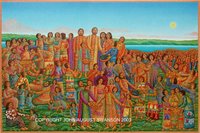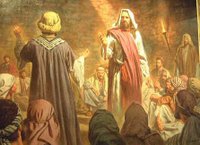Year B - Ordinary 17

2 Kings 4:42-44
Psalm 145:10-18
Ephesians 4:1-6
John 6:1-21
Alternative Scriptures
Exodus 16:1-15
Psalm 78:19-25
Revelation 2:12-17
The feeding of the 5,000 is the only one of Jesus' miracles that is attested to in all four gospels. John's version of the story is the one that we remember most often because here Andrew brings forward a young boy who has come out to hear Jesus and had enough forethought to bring his own lunch, five barley loaves and two fish. He offers his lunch to Jesus to feed the multitude.
We preachers like to use this little boy as the prototype, the poster child if you will, for self sacrifice and for giving of our substance to the service of the Lord. It is a very good theme when preaching stewardship, tithing and giving to the church.
Jesus puts Philip to the test by asking him how he intended to feed all these people. John tells us parenthetically that Jesus already knew what he was going to do and his question was a test. It was a test of Faith. Faced with an impossible task and no resources, Philip did not have the faith required to respond to the call of Jesus to feed the multitude.
Perhaps John is remembering another story that only he tells us. After the resurrection, Jesus meets the disciples on the shore of the Sea of Gallilee. He is grilling fish on an open fire. As the disciples eat the food that Jesus has prepared for them, He askes Peter, "Do you Love Me?" He asks Peter three times. Three times Peter insists, "Yea, Lord, thou knowest that I love Thee." And three times Jesus tells Peter to "Feed My Sheep."
 The calling and testing of Philip, the response of the little boy to Jesus' need for resources, the challenge to Peter, they are all object lessons for us to hear the call of Jesus to "Feed His Sheep." That calling is echoed by the Apostle Paul in the 5th chapter of 2 Corinthians, when he tells us that God is in Christ reconciling the world to himself and entrusting the message of reconciliation to us. In addition to Stewardship and heeding the call of God, we have a good text for preaching about Missions.
The calling and testing of Philip, the response of the little boy to Jesus' need for resources, the challenge to Peter, they are all object lessons for us to hear the call of Jesus to "Feed His Sheep." That calling is echoed by the Apostle Paul in the 5th chapter of 2 Corinthians, when he tells us that God is in Christ reconciling the world to himself and entrusting the message of reconciliation to us. In addition to Stewardship and heeding the call of God, we have a good text for preaching about Missions.But the Feeding of the 5,000 recalls to our minds another story told over and over by the Jews. A story of God and His people at the very beginning of their covenant together. It is a story of God's unyielding, undying love for us, His people, and His concern for our every need. We read this story in our Old Testament reading from the 16th chapter of Exodus .
God had heard the cry of anguish of his people suffering under the yoke of slavery in Egypt. He had raised up a prophet and a shepherd, Moses, to face down Pharoah and deliver the people out of their slavery.
But slavery is easy and freedom is hard. It is so easy to let someone else supply all we need and it is so hard when we are placed in a position of having to provide for our needs on our own enterprise.
Almost immediately the Israelites began to complain. "Why has the Lord brought us out of Egypt where we had three square meals a day, in to a wilderness where there is no food and no water? Has He brought us out here to die? We ought to go back to Pharoah." The Psalmist puts it like this: "Can God spread a table in the wilderness?"
God heard the grumbling of His people even as he hears the grumbling of His people today. No matter what He did for the Israelites it was never enough. No matter what He has done for us it is never enough because we do not have Faith that He will be there for us.
Three times, God answered the grumbling of the Israelites. In Massah he instructed Moses to strike the rock and out poured water to quench their thirst. Jesus is the Living water offerred to the woman at the well. He sent quail to provide the people with meat. And he sent the manna from heaven for them to use like flour to make bread. Jesus said, "take, eat, this is my body that was broken for you.
The Psalmist goes on to say the people "had no faith in God, and did not trust his saving power. Yet he commanded the skies above, and opened the doors of heaven; he rained down on them the grain of heaven."
God hears our grumbling, he hears our prayers and petitions. He intends to answer each and every one in a way that follows his divine plan for us. But He wants us to believe that He will do so. He wants us to have the kind of Faith that knows that whatever He does, will be the best for us.
But we want things our way. If God doesn't give us what we want in the way we want it, we say "Why doesn't God answer prayer?" Or, "Why do bad things happen to good people?"
God brought the people out of slavery in Egypt. But he could not take them immediately to the promised land. They weren't ready. They had to be tested and tried in the desert wilderness of Sinai for 40 years. An entire generation had to pass away so that a new generation could shake off the bonds of the mentality of slavery and put on the mentality of Faith in God.
Do you not know that God tests us and tries us in the desert wilderness? John the Baptist tells us in the very beginning of the Gospel that "One is coming more powerful than I and he will baptize you with the Holy Spirit and with Fire. His winnowing fork is in his hand to clear the threshing floor and to gather the wheat into his granery; but the chaff he will burn with unquenchable fire."
God loves us so much that He was willing to become man in the form of His Son, Jesus. And He loves us so much that He was willing to die a horrible death for us. Should we not also believe that He loves us enough to provide the things we need?
The Psalmist completes his message to us with these words: "Mortals ate of the bread of angels; He sent them food in abundance." Won't you hear, and believe?
Thanks be to God.






